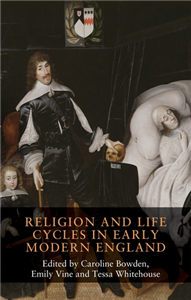Religion and life cycles in early modern England
by Caroline Bowden, Emily Vine, Tessa Whitehouse
Description
More Information
Rights Information
Albania, Algeria, Angola, Argentina, Armenia, Australia, Austria, Bahrain, Belgium, Belize, Benin, Bolivia, Bosnia and Herzegovina, Botswana, Brazil, Bulgaria, Burkina Faso, Burundi, Cameroon, Canada, Cape Verde, Central African Republic, Chad, Chile, China, Colombia, Comoros, Congo [DRC], Congo, Republic of the, Costa Rica, Ivory Coast, Croatia, Czech Republic, Denmark, Djibouti, Ecuador, Egypt, El Salvador, Equatorial Guinea, Eritrea, Estonia, Ethiopia, Faroe Islands, Finland, France, French Guiana, Gabon, Gambia, Georgia, Germany, Ghana, Greece, Guatemala, Guinea, Guinea-Bissau, Guyana, Honduras, Hongkong, Hungary, Iceland, India, Indonesia, Iran, Iraq, Ireland, Israel, Italy, Japan, Jordan, Kazakhstan, Kenya, Kuwait, Latvia, Lebanon, Lesotho, Liberia, Libya, Lithuania, Luxembourg, Macau, China, Macedonia [FYROM], Madagascar, Malawi, Malaysia, Mali, Malta, Mauritania, Mauritius, Mayotte, Mexico, Mongolia, Montenegro, Morocco, Mozambique, Namibia, Netherlands, New Zealand, Nicaragua, Niger, Nigeria, Norway, Oman, Pakistan, Panama, Paraguay, Peru, Philippines, Poland, Portugal, Puerto Rico, Qatar, Reunion, Romania, Russia, Rwanda, Saint Helena, Sao Tome and Principe, Saudi Arabia, Senegal, Serbia, Seychelles, Sierra Leone, Singapore, Slovakia, Slovenia, Somalia, South Africa, South Korea, Spain, Sri Lanka, Sudan, Suriname, Swaziland, Sweden, Switzerland, Syria, Taiwan, Tanzania, Thailand, Timor-Leste, Togo, Tokelau, Tunisia, Turkey, Uganda, Ukraine, United Arab Emirates, United Kingdom, United States, Uruguay, Venezuela, Vietnam, Western Sahara, Yemen, Zambia, Zimbabwe, South Sudan, Cyprus, Palestine, Bangladesh, Cambodia, Liechtenstein, Azerbaijan, Jamaica, Kyrgyzstan
Endorsements
Religion and life cycles in early modern England examines intersections between religion and all stages of the life course. It considers rites of passage such as birth, death and marriage, and investigates everyday experiences such as attending school and church, going to work, praying, writing letters and singing hymns. Setting examples from different contexts alongside each other, it traces how different confessions were affected by the religious and political changes that occurred in the two centuries following the Reformation. The book is structured around three phases: 'Birth, childhood and youth', 'Adulthood and everyday life', 'The dying and the dead'. It follows the threads of the bodily and social life cycles to reveal how they interweave with the religious life cycle: converting to a new religion, joining the ministry or a convent. Early modern individuals often reflected on times they personally acknowledged to have transformed their life or on events that instigated their spiritual awakening. Drawing on diaries, letters, plays, portraits, diagrams, sermons, poetry and hymns, the book demonstrates the existence of multiple, overlapping understandings of the life cycle in early modern England.
Reviews
Religion and life cycles in early modern England examines intersections between religion and all stages of the life course. It considers rites of passage such as birth, death and marriage, and investigates everyday experiences such as attending school and church, going to work, praying, writing letters and singing hymns. Setting examples from different contexts alongside each other, it traces how different confessions were affected by the religious and political changes that occurred in the two centuries following the Reformation. The book is structured around three phases: 'Birth, childhood and youth', 'Adulthood and everyday life', 'The dying and the dead'. It follows the threads of the bodily and social life cycles to reveal how they interweave with the religious life cycle: converting to a new religion, joining the ministry or a convent. Early modern individuals often reflected on times they personally acknowledged to have transformed their life or on events that instigated their spiritual awakening. Drawing on diaries, letters, plays, portraits, diagrams, sermons, poetry and hymns, the book demonstrates the existence of multiple, overlapping understandings of the life cycle in early modern England.
Author Biography
Caroline Bowden is Senior Research Fellow in History at Queen Mary University of London Emily Vine is Postdoctoral Research Fellow at the University of Birmingham Tessa Whitehouse is Senior Lecturer in English at Queen Mary University of London
Manchester University Press
Manchester University Press is a leading UK publisher known for excellent research in the humanities and social sciences.
View all titlesBibliographic Information
- Publisher Manchester University Press
- Publication Date October 2021
- Orginal LanguageEnglish
- ISBN/Identifier 9781526149237 / 1526149230
- Publication Country or regionUnited Kingdom
- FormatPrint PDF
- Pages328
- ReadershipGeneral/trade
- Publish StatusPublished
- Dimensions216 X 138 mm
- Biblio NotesDerived from Proprietary 5095
- SeriesSeventeenth- and Eighteenth-Century Studies
- Reference Code12960
Manchester University Press has chosen to review this offer before it proceeds.
You will receive an email update that will bring you back to complete the process.
You can also check the status in the My Offers area

Please wait while the payment is being prepared.
Do not close this window.



